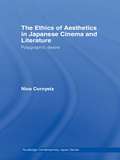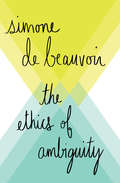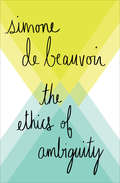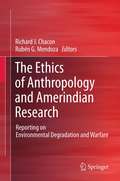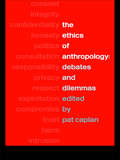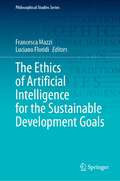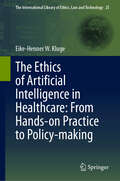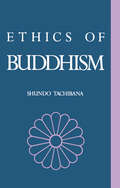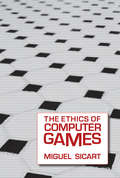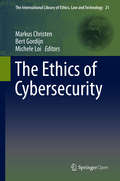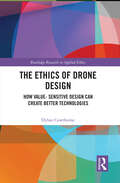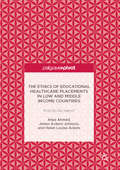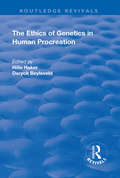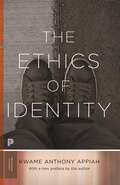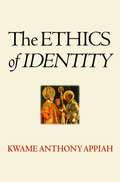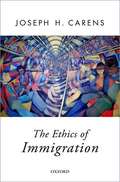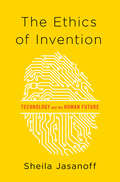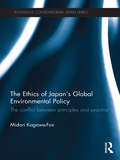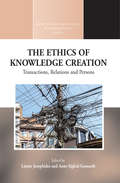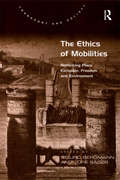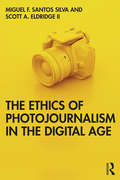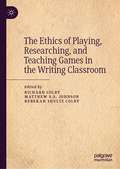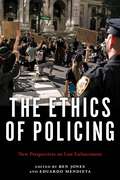- Table View
- List View
The Ethics of Aesthetics in Japanese Cinema and Literature: Polygraphic Desire (Routledge Contemporary Japan Series #Vol. 10)
by Nina CornyetzThis is an innovative, scholarly and original study of the ethics of modern Japanese aesthetics from the 1930s, through the Second World War and into the post-war period. Nina Cornyetz embarks on new and unprecedented readings of some of the most significant literary and film texts of the Japanese canon, for instance works by Kawabata Yasunari, Mishima Yukio, Abe Kôbô and Shinoda Masahiro, all renowned for their texts' aesthetic and philosophic brilliance. Cornyetz uniquely opens up the field in a fresh and controversial way by showing how these authors and filmmakers' concepts of beauty and relation to others were, in fact, deeply impacted by political and social factors. Probing questions are asked such as: How did Japanese fascism and imperialism ideologically, politically and aesthetically impact on these literary/cinematic giants? How did the emperor as the 'nodal point' for Japanese national identity affect their ethics? What were the repercussions of the virtual collapse of the Marxist movement in the 1960s? What are the similarities and differences between pre-war, wartime and post-war ideals of beauty and those of fascist aesthetics in general? This ground-breaking work is truly interdisciplinary and will appeal to students and scholars of Japanese literature, film, gender, culture, history and even psychoanalytic theory.
The Ethics of Ambiguity
by Simone De BeauvoirIn de Beauvoir's second major essay, the renowned French philosopher illustrates the ethics of Existentialism by outlining a series of "ways of being"In this classic introduction to Existentialist thought, French philosopher Simone de Beauvoir's The Ethics of Ambiguity simultaneously pays homage to and grapples with her French contemporaries, philosophers Jean-Paul Sartre and Maurice Merleau-Ponty, by arguing that the freedoms in Existentialism carry with them certain ethical responsibilities. While contemplating Nihilism, Surrealism, Existentialism, Objectivity, and human values, The Ethics of Ambiguity is a thorough examination of existence and what it means to human life. To do this, de Beauvoir outlines a series of "ways of being" (the adventurer, the passionate person, the lover, the artist, and the intellectual), each of which overcomes the former's deficiencies, and therefore can live up to the responsibilities of freedom. Ultimately, de Beauvoir argues that in order to achieve true freedom, one must battle against the choices and activities of those who suppress it.
The Ethics of Ambiguity: The Second Sex And The Ethics Of Ambiguity
by Simone de BeauvoirFrom the groundbreaking author of The Second Sex comes a radical argument for ethical responsibility and freedom. In this classic introduction to existentialist thought, French philosopher Simone de Beauvoir&’s The Ethics of Ambiguity simultaneously pays homage to and grapples with her French contemporaries, philosophers Jean-Paul Sartre and Maurice Merleau-Ponty, by arguing that the freedoms in existentialism carry with them certain ethical responsibilities. De Beauvoir outlines a series of &“ways of being&” (the adventurer, the passionate person, the lover, the artist, and the intellectual), each of which overcomes the former&’s deficiencies, and therefore can live up to the responsibilities of freedom. Ultimately, de Beauvoir argues that in order to achieve true freedom, one must battle against the choices and activities of those who suppress it. The Ethics of Ambiguity is the book that launched Simone de Beauvoir&’s feminist and existential philosophy. It remains a concise yet thorough examination of existence and what it means to be human.
The Ethics of Anthropology and Amerindian Research
by Richard J. Chacon Rubén G. MendozaThe decision to publish scholarly findings bearing on the question of Amerindian environmental degradation, warfare, and/or violence is one that weighs heavily on anthropologists. This burden stems from the fact that documentation of this may render descendant communities vulnerable to a host of predatory agendas and hostile modern forces. Consequently, some anthropologists and community advocates alike argue that such culturally and socially sensitive, and thereby, politically volatile information regarding Amerindian-induced environmental degradation and warfare should not be reported. This admonition presents a conundrum for anthropologists and other social scientists employed in the academy or who work at the behest of tribal entities. This work documents the various ethical dilemmas that confront anthropologists, and researchers in general, when investigating Amerindian communities. The contributions to this volume explore the ramifications of reporting--and, specifically,--of non-reporting instances of environmental degradation and warfare among Amerindians. Collectively, the contributions in this volume, which extend across the disciplines of archaeology, anthropology, ethnohistory, ethnic studies, philosophy, and medicine, argue that the non-reporting of environmental mismanagement and violence in Amerindian communities generally harms not only the field of anthropology but the Amerindian populations themselves.
The Ethics of Anthropology: Debates and Dilemmas
by Pat CaplanSince the inception of their discipline, anthropologists have studied virtually every conceivable aspect of other peoples' morality - religion, social control, sin, virtue, evil, duty, purity and pollution. But what of the examination of anthropology itself, and of its agendas, epistemes, theories and praxes? In 1991, Raymond Firth spoke of social anthropology as an essentially moral discipline. Is such a view outmoded in a postmodern era? Do anthropological ethics have to be re-thought each generation as the conditions of the discipline change, and as choices collide with moral alternatives? The Ethics of Anthropology looks at some of these crucial issues as they reflect on researcher relations, privacy, authority, secrecy and ownership of knowledge. The book combines theoretical papers and case studies from eminent scholars including Lisette Josephides, Steven Nugent, Marilyn Silverman, Andrew Spiegel and Veronica Strang. Showing how the topic of ethics goes to the heart of anthropology, it raises the controversial question of why - and for whom - the anthropological discipline functions.
The Ethics of Artificial Intelligence for the Sustainable Development Goals (Philosophical Studies Series #152)
by Luciano Floridi Francesca MazziThis volume provides an extensive overview of the Ethics of Artificial Intelligence for the Sustainable Development Goals. The authors are experts contributing with perspectives from different fields. The comprehensive collection of chapters illustrates the pressing governance problems related to using AI for the SDGs, and case studies describing how AI is advancing and can advance the achievement of the Goals. Students, scholars, and practitioners working on AI for SDGs, the ethical governance of AI, sustainability, and the fourth revolution can find this book a helpful reference.
The Ethics of Artificial Intelligence in Healthcare: From Hands-on Practice to Policy-making (The International Library of Ethics, Law and Technology #25)
by Eike-Henner W. KlugeThis book provides an ethical analysis of the ethical issues that arise in the design, nature and use of AIs as they are currently used in the delivery and planning of healthcare by hands-on healthcare professionals, institutional administrators and social policy makers. It suggests that while these issues overlap, they have distinct aspects in the respective domains. Among other things, it distinguishing between AIs as expert systems as they are currently constituted and AIs as based in quantum computers or as constituted of bio-printed material, indicates how this is evolving and outlines the ethically relevant issues that would then arise.
The Ethics of Buddhism
by Shundo TachibanaA popular, if erroneous, conception of Buddhism has been that of self-negation or even nihilism, that is to say a religion that is negative in its basic attitude. In this classic work, Professor Tachibana instead argues that Buddhism is an essentially positive creed that provides an ethical philosophy that remains relevant irrespective of time and place. This is the 'Middle Way', with eight qualities or virtues - understanding, thought, speech, action, livelihood, effort, mindfulness and concentration - that form the core of the Buddhist philosophy of life. It is these great moral attributes that Professor Tachibana expounds as being the essence of Buddhism and providing a way of life based on tolerance and benevolence.
The Ethics of Care: Moral Knowledge, Communication, and the Art of Caregiving (Routledge Studies in Health and Social Welfare)
by Stuart J. Murray Alan BlumBeginning with a focus on the ethical foundations of caregiving in health and expanding towards problems of ethics and justice implicated in a range of issues, this book develops and expands the notion of care itself and its connection to practice. Organised around the themes of culture as a restraint on caregiving in different social contexts and situations, innovative methods in healthcare, and the way in which culture works to position care as part of a rhetorical approach to dependency, responsibility, and justice, The Ethics of Care presents case studies examining institutional responses to end-of-life issues, the notion of informed consent, biomedicine, indigenous rights and postcolonialism in care and theoretical approaches to the concept of care. Offering discussions from a variety of disciplinary approaches, including sociology, communication, and social theory, as well as hermeneutics, phenomenology, and deconstruction, this book will appeal to scholars across the social sciences with interests in healthcare, medicine, justice and the question of how we think about care as a notion and social form, and how this is related to practice.
The Ethics of Computer Games
by Miguel SicartWhy computer games can be ethical, how players use their ethical values in gameplay, and the implications for game design. Despite the emergence of computer games as a dominant cultural industry (and the accompanying emergence of computer games as the subject of scholarly research), we know little or nothing about the ethics of computer games. Considerations of the morality of computer games seldom go beyond intermittent portrayals of them in the mass media as training devices for teenage serial killers. In this first scholarly exploration of the subject, Miguel Sicart addresses broader issues about the ethics of games, the ethics of playing the games, and the ethical responsibilities of game designers. He argues that computer games are ethical objects, that computer game players are ethical agents, and that the ethics of computer games should be seen as a complex network of responsibilities and moral duties. Players should not be considered passive amoral creatures; they reflect, relate, and create with ethical minds. The games they play are ethical systems, with rules that create gameworlds with values at play. Drawing on concepts from philosophy and game studies, Sicart proposes a framework for analyzing the ethics of computer games as both designed objects and player experiences. After presenting his core theoretical arguments and offering a general theory for understanding computer game ethics, Sicart offers case studies examining single-player games (using Bioshock as an example), multiplayer games (illustrated by Defcon), and online gameworlds (illustrated by World of Warcraft) from an ethical perspective. He explores issues raised by unethical content in computer games and its possible effect on players and offers a synthesis of design theory and ethics that could be used as both analytical tool and inspiration in the creation of ethical gameplay.
The Ethics of Cybersecurity (The International Library of Ethics, Law and Technology #21)
by Markus Christen Bert Gordijn Michele LoiThis open access book provides the first comprehensive collection of papers that provide an integrative view on cybersecurity. It discusses theories, problems and solutions on the relevant ethical issues involved. This work is sorely needed in a world where cybersecurity has become indispensable to protect trust and confidence in the digital infrastructure whilst respecting fundamental values like equality, fairness, freedom, or privacy. The book has a strong practical focus as it includes case studies outlining ethical issues in cybersecurity and presenting guidelines and other measures to tackle those issues. It is thus not only relevant for academics but also for practitioners in cybersecurity such as providers of security software, governmental CERTs or Chief Security Officers in companies.
The Ethics of Drone Design: How Value-Sensitive Design Can Create Better Technologies (Routledge Research in Applied Ethics)
by Dylan CawthorneThis book presents a holistic approach to the design and use of drones. It argues that this powerful technology requires high levels of ethical analysis and responsibility – our moral progress must keep pace with our technological progress. Drone technologies support and diminish the flourishing of certain human values, impact power relations between individuals and groups, and add an additional element to the complex network of humans and objects in modern society. The book begins by introducing four prototype drones designed and built by the author: the healthcare drone, the search and rescue drone, the educational drone, and the spiritual drone. These drones have been developed using a value-sensitive design approach – with values such as human welfare, privacy, trust, environmental sustainability, and justice at the forefront. Ethical analyses and social impacts are taken as design inputs, leading to the creation of better, more responsible drone designs. The book then showcases additional methods used to develop the prototype drones from the fields of engineering, ethics, and art, including ethical frameworks, ethics standards, capability caution, and speculative design. The holistic approach reveals a more subtle and nuanced view of drones than the currently polarized characterization of "the good drone" or "the killer drone". The book concludes with recommendations for drone engineers, companies, lawmakers, and citizens on how to support ethics in drone design. The Ethics of Drone Design is an essential resource for scholars, advanced students, engineers, and designers interested in the ethics of technology.
The Ethics of Drone Design: How Value-Sensitive Design Can Create Better Technologies (Routledge Research in Applied Ethics)
by Dylan CawthorneThis book presents a holistic approach to the design and use of drones. It argues that this powerful technology requires high levels of ethical analysis and responsibility – our moral progress must keep pace with our technological progress. Drone technologies support and diminish the flourishing of certain human values, impact power relations between individuals and groups, and add an additional element to the complex network of humans and objects in modern society. The book begins by introducing four prototype drones designed and built by the author: the healthcare drone, the search and rescue drone, the educational drone, and the spiritual drone. These drones have been developed using a value-sensitive design approach – with values such as human welfare, privacy, trust, environmental sustainability, and justice at the forefront. Ethical analyses and social impacts are taken as design inputs, leading to the creation of better, more responsible drone designs. The book then showcases additional methods used to develop the prototype drones from the fields of engineering, ethics, and art, including ethical frameworks, ethics standards, capability caution, and speculative design. The holistic approach reveals a more subtle and nuanced view of drones than the currently polarized characterization of "the good drone" or "the killer drone". The book concludes with recommendations for drone engineers, companies, lawmakers, and citizens on how to support ethics in drone design. The Ethics of Drone Design is an essential resource for scholars, advanced students, engineers, and designers interested in the ethics of technology.
The Ethics of Educational Healthcare Placements in Low and Middle Income Countries: First Do No Harm?
by Helen Louise Ackers James Ackers-Johnson Anya AhmedThis book is open access under a CC BY 4.0 license.This book examines the current state of elective placements of medical undergraduate students in developing countries and their impact on health care education at home. Drawing from a recent case study of volunteer deployment in Uganda, the authors provide an in-depth evaluation of the impacts on the students themselves and the learning outcomes associated with placements in low resource settings, as well as the impacts that these forms of student mobility have on the host settings. In addition to reviewing the existing literature on elective placements, the authors outline a potential model for the future development of ethical elective placements. As the book concurs with an increasing international demand for elective placements, it will be of immediate interest to universities, intermediary organizations, students as consumers, and hosting organisations in low-resource settings.
The Ethics of Genetics in Human Procreation
by Deryck Beyleveld Hille HakerThis title was first published in 2000: This third volume of proceedings of the European Network for Biomedical Ethics focuses on the ethical issues surrounding the debates on reproductive medicine and genetics in human procreation. Central issues include procreation and parenthood, moral protection of the human embryo and foetus, autonomy and recognition, social implications, moral reasoning in applied ethics, legal regulations of assisted procreation, genetic diagnosis and gene therapy. The legal regulation paper evaluates the central laws and guidelines of European countries.
The Ethics of Identity (Princeton Classics #132)
by Kwame Anthony AppiahA bold vision of liberal humanism for navigating today’s complex world of growing identity politics and rising nationalismCollective identities such as race, nationality, religion, gender, and sexuality clamor for recognition and respect, sometimes at the expense of other things we value. To what extent do they constrain our freedom, and to what extent do they enable our individuality? Is diversity of value in itself? Has the rhetoric of human rights been overstretched? Kwame Anthony Appiah draws on thinkers through the ages and across the globe to explore such questions, developing an account of ethics that connects moral obligations with collective allegiances and that takes aim at clichés and received ideas about identity. This classic book takes seriously both the claims of individuality—the task of making a life—and the claims of identity, these large and often abstract social categories through which we define ourselves.
The Ethics of Identity (Princeton Classics Ser. #132)
by Kwame Anthony AppiahRace, ethnicity, nationality, religion, gender, sexuality: in the past couple of decades, a great deal of attention has been paid to such collective identities. They clamor for recognition and respect, sometimes at the expense of other things we value. But to what extent do "identities" constrain our freedom, our ability to make an individual life, and to what extent do they enable our individuality? In this beautifully written work, renowned philosopher and African Studies scholar Kwame Anthony Appiah draws on thinkers through the ages and across the globe to explore such questions.The Ethics of Identity takes seriously both the claims of individuality—the task of making a life—and the claims of identity, these large and often abstract social categories through which we define ourselves.What sort of life one should lead is a subject that has preoccupied moral and political thinkers from Aristotle to Mill. Here, Appiah develops an account of ethics, in just this venerable sense—but an account that connects moral obligations with collective allegiances, our individuality with our identities. As he observes, the question who we are has always been linked to the question what we are.Adopting a broadly interdisciplinary perspective, Appiah takes aim at the clichés and received ideas amid which talk of identity so often founders. Is "culture" a good? For that matter, does the concept of culture really explain anything? Is diversity of value in itself? Are moral obligations the only kind there are? Has the rhetoric of "human rights" been overstretched? In the end, Appiah's arguments make it harder to think of the world as divided between the West and the Rest; between locals and cosmopolitans; between Us and Them. The result is a new vision of liberal humanism—one that can accommodate the vagaries and variety that make us human.
The Ethics of Immigration
by Joseph CarensCarens begins by focusing on current immigration controversies in North America and Europe about access to citizenship, the integration of immigrants, temporary workers, irregular migrants and the admission of family members and refugees. Working within the moral framework provided by liberal democratic values, he argues that some of the practices of democratic states in these areas are morally defensible, while others need to be reformed. In the last part of the book he moves beyond the currently feasible to ask questions about immigration from a more fundamental perspective. He argues that democratic values of freedom and equality ultimately entail a commitment to open borders. Only in a world of open borders, he contends, will we live up to our most basic principles. Many will not agree with some of Carens' claims, especially his controversial conclusion, but none will be able to dismiss his views lightly. Powerfully argued by one of the world's leading political philosophers on the issue, The Ethics of Immigration is a landmark work on one of the most important global social trends of our era.
The Ethics of Invention: Technology and the Human Future
by Sheila JasanoffWe live in a world increasingly governed by technology--but to what end? Technology rules us as much as laws do. It shapes the legal, social, and ethical environments in which we act. Every time we cross a street, drive a car, or go to the doctor, we submit to the silent power of technology. Yet, much of the time, the influence of technology on our lives goes unchallenged by citizens and our elected representatives. In The Ethics of Invention, renowned scholar Sheila Jasanoff dissects the ways in which we delegate power to technological systems and asks how we might regain control. Our embrace of novel technological pathways, Jasanoff shows, leads to a complex interplay among technology, ethics, and human rights. Inventions like pesticides or GMOs can reduce hunger but can also cause unexpected harm to people and the environment. Often, as in the case of CFCs creating a hole in the ozone layer, it takes decades before we even realize that any damage has been done. Advances in biotechnology, from GMOs to gene editing, have given us tools to tinker with life itself, leading some to worry that human dignity and even human nature are under threat. But despite many reasons for caution, we continue to march heedlessly into ethically troubled waters. As Jasanoff ranges across these and other themes, she challenges the common assumption that technology is an apolitical and amoral force. Technology, she masterfully demonstrates, can warp the meaning of democracy and citizenship unless we carefully consider how to direct its power rather than let ourselves be shaped by it. The Ethics of Invention makes a bold argument for a future in which societies work together--in open, democratic dialogue--to debate not only the perils but even more the promises of technology.
The Ethics of Japan's Global Environmental Policy: The conflict between principles and practice (Routledge Contemporary Japan Series)
by Midori Kagawa-FoxThis book examines the Japanese government policies that impact on the environment in order to determine whether they incorporate a sufficient ethical substance. Through the three case studies on whaling, nuclear energy, and forestry, the author explores how Western philosophers combined their theories to develop a ‘Western environmental ethics code’ and reveals the existence of a unique ‘Japanese environmental ethics code’ built on Japan’s cultural traditions, religious practices, and empirical experiences. Kagawa-Fox’s discussions show that in spite of the positive contributions that Japan has made towards the global environment, the government has failed to show a corresponding moral obligation to the world ecology in its environmental policy. The book argues that this is a result of the integrity of the policies having been compromised by vested interests and that Japanese business and politics ensure that the policies are primarily focused on maintaining sustainable economic growth. Whilst Japan's global environmental initiatives are the key to its economic survival in the 21st century, and these initiatives may achieve their aims, they do however fail the Japanese code of environmental ethics. This book is essential reading for anyone interested in Environmental Studies, Environmental Policy and Ethics, Japanese Politics and Japanese Culture and Society.
The Ethics of Knowledge Creation: Transactions, Relations, and Persons (Methodology & History in Anthropology #31)
by Lisette Josephides Anne Sigfrid GrønsethAnthropology lies at the heart of the human sciences, tackling questions having to do with the foundations, ethics, and deployment of the knowledge crucial to human lives. The Ethics of Knowledge Creation focuses on how knowledge is relationally created, how local knowledge can be transmuted into ‘universal knowledge’, and how the transaction and consumption of knowledge also monitors its subsequent production. This volume examines the ethical implications of various kinds of relations that are created in the process of ‘transacting knowledge’ and investigates how these transactions are also situated according to broader contradictions or synergies between ethical, epistemological, and political concerns.
The Ethics of Mobilities: Rethinking Place, Exclusion, Freedom and Environment (Transport and Society)
by Tore SagerWith this book the international academic discourse on mobility is taken a step further, through the intertwined perspectives of different social sciences, engineering and the humanities. The Ethics of Mobilities departs from the recent interest in social surveillance, raised by the use of technology for the surveillance and control of mobility as well as for transport. It widens this theme to encompass a broad scale of issues, ranging from freedom and escape to social exclusion and control, thus raising important questions of ethics, identity and religion; questions that are dealt with by a diverse, yet structured range of chapters, arranged around the themes of ethics and religion, and freedom and control. Through their variety and diversity of perspectives, the chapters of this book offer a substantial interdisciplinary contribution to the socially and environmentally relevant discussion about what a technically and economically accelerating mobility does to life and how it might be transformed to sustain a more life-enhancing future. Ethics of Mobilities will excite not only international interest, but will also appeal to scholars across a wide range of disciplines, in fields as diverse as theology and engineering.
The Ethics of Photojournalism in the Digital Age
by Scott A. Eldridge II Miguel Franquet Santos SilvaDelving into the complexities of contemporary reportage, this book draws from moral philosophy and histories of photojournalism to understand the emergence of this distinct practice and discuss its evolution in a digital era. In arguing that the digitization of photography obliges us to radically challenge some of the traditional conceptions of press photography, this book addresses the historic opposition between artistic and journalistic photographs, showing and challenging how this has subtly inspired support for a forensic approach to photojournalism ethics. The book situates this debate within questions of relativism over what is ‘moral’, and normative debates over what is ‘journalistic’, alongside technical debates as to what is ‘possible’, to underpin a discussion of photojournalism as an ethical, moral, and societally important journalistic practice. Including detailed comparative analyses of codes of ethics, examination of controversial cases, and a study of photojournalism ethics as applied in different newsrooms, the book examines how ethical principles are applied by the global news media and explores the potential for constructive dialogue between different voices interested in pursuing the best version of photojournalism. A targeted, comprehensive and engaging book, this is a valuable resource for academics, researchers and students of photojournalism, as well as philosophy, communications and media studies more broadly.
The Ethics of Playing, Researching, and Teaching Games in the Writing Classroom
by Richard Colby Rebekah Shultz Colby Matthew S.S. JohnsonThis book explores ethos and games while analyzing the ethical dimensions of playing, researching, and teaching games. Contributors, primarily from rhetoric and writing studies, connect instances of ethos and ethical practice with writing pedagogy, game studies, video games, gaming communities, gameworlds, and the gaming industry. The collection’s eighteen chapters investigate game-based writing classrooms, gamification, game design, player agency, and writing and gaming scholarship in order to illuminate how ethos is reputed, interpreted, and remembered in virtual gamespaces and in the gaming industry. Ethos is constructed, invented, and created in and for games, but inevitably spills out into other domains, affecting agency, ideology, and the cultures that surround game developers, players, and scholars.
The Ethics of Policing: New Perspectives on Law Enforcement
by Edited by Ben Jones and Eduardo MendietaTop scholars provide a critical analysis of the current ethical challenges facing police officers, police departments, and the criminal justice systemFrom George Floyd to Breonna Taylor, the brutal deaths of Black citizens at the hands of law enforcement have brought race and policing to the forefront of national debate in the United States. In The Ethics of Policing, Ben Jones and Eduardo Mendieta bring together an interdisciplinary group of scholars across the social sciences and humanities to reevaluate the role of the police and the ethical principles that guide their work.With contributors such as Tracey Meares, Michael Walzer, and Franklin Zimring, this volume covers timely topics including race and policing, the use of aggressive tactics and deadly force, police abolitionism, and the use of new technologies like drones, body cameras, and predictive analytics, providing different perspectives on the past, present, and future of policing, with particular attention to discriminatory practices that have historically targeted Black and Brown communities. This volume offers cutting-edge insight into the ethical challenges facing the police and the institutions that oversee them. As high-profile cases of police brutality spark protests around the country, The Ethics of Policing raises questions about the proper role of law enforcement in a democratic society.
